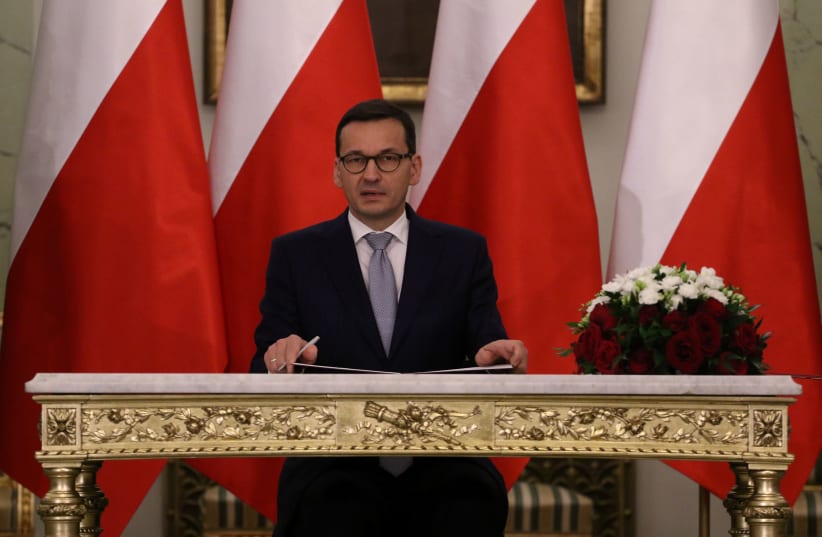In the latest diplomatic spat between Poland and Israel, the Polish Foreign Ministry canceled a scheduled visit of an Israeli delegation to Warsaw on Monday, which was expected to discuss restitution of Jewish property that was nationalized by the Polish Communist government after the Second World War.
The ministry issued a short statement on its website saying the visit was canceled “after the Israeli side made last minute changes in the composition of the delegation, suggesting that the talks would primarily focus on the issues related to property restitution.”
The head of the Israeli delegation was supposed to have been Social Equality Ministry director-general Avi Cohen Sakali and was supposed to have met with senior officials in the Polish government, specifically regarding Jewish property stolen during the Holocaust.
Additionally, the Social Equality Ministry has been working on these issues with officials in the Polish government for four years.
The Jerusalem Post understands that there were no last minute changes to the personnel in the delegation.
Restitution of Jewish property from Poland has become an extremely sensitive issue in recent months, especially following comments made by US Secretary of State Mike Pompeo urging the country to pass restitution legislation.
Polish Prime Minister Mateusz Morawiecki has said that Poland will not pay compensation for property, while far-right demonstrators marched in protest through Warsaw on Saturday against such proposals.
Some observers have said, however, that the issue may be coming to the fore due to imminent elections to the EU Parliament later this month, as well as Polish parliamentary elections in November.
The JUST Act – passed by the US Congress in 2017 requiring the State Department to report to Congress on the progress of European governments in providing restitution and compensation to Holocaust survivors who lost their property during the war – has of late aroused the ire of far-right Polish groups.
With the Polish parliamentary elections coming up, the Law and Justice Party (PiS) is anxious first to preserve its absolute majority in both houses of parliament, and to prevent some far-right voters who currently vote for PiS to defect to specifically far-right parties.
Taking a hawkish stance on the issue of restitution of Jewish property may be designed to head off potentially damaging accusations from the Polish far-right during an election season.
Chief Rabbi of Poland Rabbi Michael Schudrich said following the cancellation of the Israeli delegation’s visit that the issue of property restitution was a moral one.
“People who had property stolen by the Germans and then by the Communists morally deserve their property back or some kind of compensation,” said Schudrich.
“What we’re seeing now probably has more to do with domestic politics than it does with moral issues,” he added in reference to the cancellation.
Gideon Taylor, chairman of operations for the World Jewish Restitution Organization (WJRO) said, however, that he was “disappointed” that recent rhetoric “has blocked the real issue, which is of basic historical justice.”
He agreed with claims made by Morawiecki that Poland was a victim in the Second World War, but insisted that WJRO was specifically seeking property taken by the Polish Communist government in the 1940s and 1950s.
“Non-Jewish and Jewish property owners, including Holocaust survivors and their families, have waited for Poland to provide them with a measure of justice,” said Taylor.
“This issue is not about the German Nazi confiscations during the occupation of Poland. It is about property subsequently nationalized by the Polish Communists that continues to benefit the Polish economy.”
He noted that the Polish government itself introduced draft legislation to address the problem last year and said that WJRO hopes for “renewed dialogue with Poland so that they can address this historical injustice.”
One especially thorny issue within the debate over restitution is that of so-called heirless property, where there are no living claimants to property that was once owned by Jews.
The Polish government strongly opposes restitution of such property, since it believes that it would imply Polish responsibility for the Holocaust itself.
The JUST Act focuses specifically on the requirement to report on the implementation of the 2009 Terezin Declaration – signed by 47 European countries, including Poland.
The declaration says that signatories should provide restitution or compensation for property for which there is living heirs, and also states that heirless property could be used to benefit needy Holocaust survivors, as well as for the commemoration of the Holocaust and Holocaust education.
Taylor said cautiously that the use of heirless assets for Holocaust survivors “should be part of the discussion” on property restitution and compensation.
Zack Evans contributed to this report.
